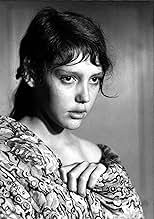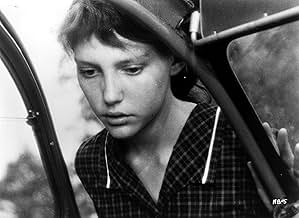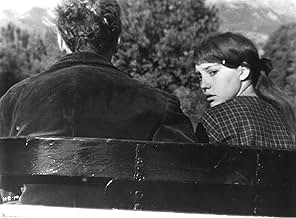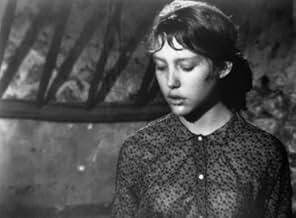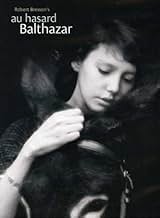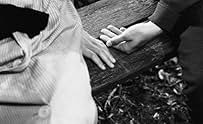The story of a mistreated donkey and the people around him. A study on saintliness and a sister piece to Bresson's Mouchette.The story of a mistreated donkey and the people around him. A study on saintliness and a sister piece to Bresson's Mouchette.The story of a mistreated donkey and the people around him. A study on saintliness and a sister piece to Bresson's Mouchette.
- Awards
- 7 wins & 2 nominations total
Mylène Van der Mersch
- Nurse
- (as Mylène Weyergans)
- Director
- Writer
- All cast & crew
- Production, box office & more at IMDbPro
Featured reviews
Born into a world of despair, pain and fear, with a back to carry allsorts on and two eyes to fill with tears, abused and often put upon, never knowing where things might have gone, but conforming to the stick and whip, while no one hears your prayers.
Poor old Balthazar doesn't know which way to turn, on occasions folks are kind and free, at other times they let him burn, but why are they so changeable, what makes these people tick, is it natural that their spirit is to hurt, with pain inflict.
The hazards of being a young woman growing up in rural France and the challenges of a donkey with the same backdrop, both brilliantly performed by the donkey and Anne Wiazemsky, who leave you under no illusion of the suffering they have to endure.
Poor old Balthazar doesn't know which way to turn, on occasions folks are kind and free, at other times they let him burn, but why are they so changeable, what makes these people tick, is it natural that their spirit is to hurt, with pain inflict.
The hazards of being a young woman growing up in rural France and the challenges of a donkey with the same backdrop, both brilliantly performed by the donkey and Anne Wiazemsky, who leave you under no illusion of the suffering they have to endure.
This is a very important film. It makes you look into yourself and examine your own worth.
The world is not a fair place to live in. It has its own social structures and with each their is a certain perception of worth. Robert Bresson displays these perceptions from the bottom up.
Much like Vittorio DeSica's Umberto D, this film intertwines the relationship between man and beast. But who is the beast? It's society.
With images shot in crisp black and white Robert Bresson reveals the sordidness of the human soul, how cruel, selfish, pathetic, and unjust it can be. Au Hasard Balthazar is not an easy film to watch, but its honesty and approach towards society's injustices make it a must see.
The world is not a fair place to live in. It has its own social structures and with each their is a certain perception of worth. Robert Bresson displays these perceptions from the bottom up.
Much like Vittorio DeSica's Umberto D, this film intertwines the relationship between man and beast. But who is the beast? It's society.
With images shot in crisp black and white Robert Bresson reveals the sordidness of the human soul, how cruel, selfish, pathetic, and unjust it can be. Au Hasard Balthazar is not an easy film to watch, but its honesty and approach towards society's injustices make it a must see.
It took me years to track down a video copy of this rare film. It was definitely worth searching for. It's my favorite of Bresson's films. A very intense and dark drama about the quality of human and animal life on the face of the earth. This film will definitely bring you to your knees.
The star of Au hasard Balthazar is a donkey, a trained animal that has been led, goaded, into what passes, in an animal sense, for a performance. Of course there is nothing new about this - animals have been stars since Rescued By Rover - yet there is something unique about the performance of the donkey in Au hasard Balthazar, something that strikes one sort of funny if one gets to thinking about it. It has to do with the approach of Robert Bresson, a director whose way of working with actors was, shall we say, unusual. An auteurist in the purest sense, Bresson believed, zealously it seems, that the director should be the sole creative force behind a film, the one person responsible for the movie's tone, its meaning. The problem with most movies, if you look at things in a Bressonian way, is that stubborn habit of actors to sometimes change the meaning, the texture of a scene by how they play it - that irksome tendency of actors to take the creative reins themselves, and slip things into scenes that aren't meant to be there. Bresson's solution to this problem? Rehearse your actors to death, make them do take-after-take until the words no longer mean anything to them, until they have lost the ability to be spontaneous anymore, to do anything but what their director tells them to - in short, break them like animals. The people in Bresson's films perform their actions with the same hollow, mechanical absence-of-will one perceives in a circus elephant rolling a ball, and this is exactly as Bresson wants it, for it allows him to carry out his cinematic plans without fear of their being subverted by an actor who has some contradictory notion in their head of what a scene is supposed to be about, who their character is. The human actors in Au hasard Balthazar, stripped of their emotional tools, their tricks, occupy exactly the same plane as the donkey Balthazar, who is, as they are, a trained animal, an element in a composition.
The first scenes are an idyll: the foal Balthazar, new-stripped from his mother's teat, becomes the favorite pet of a group of kids spending the summer together on a farm. This is a time for frolicking, for amorously carving names into benches - but alas the childish harmony is doomed soon to end. Bresson conveys the fleetingness of youth, cutting quickly through a series of tableaux depicting carelessness and joy slightly darkened by the presence of a sickly young girl; then without warning we're presented with the realities of grown-up existence, embodied most cruelly by the image of poor Balthazar, now grown, harnessed to a salt-wagon (salt having ironically been his favorite treat during his care-free younger days). It's here that Bresson gives us an indication as to the donkey's more-than-animal nature: Balthazar, having been mistreated, rebels against his owner, tips the wagon and, about to be set upon by a mob of men with pitch-forks, flees. Some instinct - or is it conscious will? - leads Balthazar back to the farm, which has been taken over by a former schoolteacher whose daughter, Marie, once one of Balthazar's playmates, still resides, her existence a lonely one. This would seem the beginning of a new happiness for Balthazar, but the donkey's fate is alas still clouded with gloom. Marie becomes the object of the juvenile delinquent Gerard's amorous attentions; for obscure reasons the jaded miscreant is resentful of Balthazar, and avails himself of every opportunity to torture the poor beast.
Tenderness and cruelty live side-by-side in Au hasard Balthazar, and seem equally the product of an almost mindless instinct. Nowhere is this embodied more purely than in the character of Gerard (Francois Lafarge), the angry sadist who becomes Balthazar's chief tormentor. Gerard is capable of being gentle, as demonstrated by his wooing of the poor farm-girl Marie (the Pre-Raphaelite beauty Anne Wiazemsky), but he's equally capable of unfeeling viciousness, as when he ties a piece of newspaper to Balthazar's tail and sets it alight. Is Gerard a good person or a bad one? Does he hate Balthazar, does he love Marie? These questions seem of little concern to Bresson, who views human affairs in terms of irresistible internal forces. Bresson, in a mysterious, vaguely irreverent way, blurs the line between human and animal, brings human behavior into the animal world while elevating Balthazar to the quasi-human. There's an awareness to Balthazar that's more than you would expect from your average quadruped, and it's through this hint of sentience that one begins seeing the saintly qualities in Balthazar, the patient endurance of hardship, the radiance of spirit.
It's an amazingly delicate piece of work by Bresson, an audacious idea carried out with the utmost discretion and skill. Perhaps only Bresson among all filmmakers could've made this idea work, because only he had mastered the art of rendering existence nearly abstract while at the same time achieving powerful emotional effects. If the film were merely symbolist it would be irrelevant - Balthazar can of course be seen as a symbol for a lot of things, but it doesn't seem right to reduce him to some emblem of suffering, some Christ-like trope. Balthazar is above all a character, a protagonist in a drama, but of course in Bresson there is never any sense of conventional drama, of easy emotion. As a storyteller Bresson was efficient but patient - his scenes never go on longer than they need to, yet you wouldn't call the pacing urgent. There's something about Bresson's cutting that keeps the story flowing briskly while never engendering a sense of hurry. He moves from one character to another, one situation to another, with an unfussy ease that shames most conventional directors with their dependence on transitions, devices and segues. The film's very pace helps convey Balthazar's saintly nature, his perseverance. It's a work at once touching, bold, enigmatic and stirringly human.
The first scenes are an idyll: the foal Balthazar, new-stripped from his mother's teat, becomes the favorite pet of a group of kids spending the summer together on a farm. This is a time for frolicking, for amorously carving names into benches - but alas the childish harmony is doomed soon to end. Bresson conveys the fleetingness of youth, cutting quickly through a series of tableaux depicting carelessness and joy slightly darkened by the presence of a sickly young girl; then without warning we're presented with the realities of grown-up existence, embodied most cruelly by the image of poor Balthazar, now grown, harnessed to a salt-wagon (salt having ironically been his favorite treat during his care-free younger days). It's here that Bresson gives us an indication as to the donkey's more-than-animal nature: Balthazar, having been mistreated, rebels against his owner, tips the wagon and, about to be set upon by a mob of men with pitch-forks, flees. Some instinct - or is it conscious will? - leads Balthazar back to the farm, which has been taken over by a former schoolteacher whose daughter, Marie, once one of Balthazar's playmates, still resides, her existence a lonely one. This would seem the beginning of a new happiness for Balthazar, but the donkey's fate is alas still clouded with gloom. Marie becomes the object of the juvenile delinquent Gerard's amorous attentions; for obscure reasons the jaded miscreant is resentful of Balthazar, and avails himself of every opportunity to torture the poor beast.
Tenderness and cruelty live side-by-side in Au hasard Balthazar, and seem equally the product of an almost mindless instinct. Nowhere is this embodied more purely than in the character of Gerard (Francois Lafarge), the angry sadist who becomes Balthazar's chief tormentor. Gerard is capable of being gentle, as demonstrated by his wooing of the poor farm-girl Marie (the Pre-Raphaelite beauty Anne Wiazemsky), but he's equally capable of unfeeling viciousness, as when he ties a piece of newspaper to Balthazar's tail and sets it alight. Is Gerard a good person or a bad one? Does he hate Balthazar, does he love Marie? These questions seem of little concern to Bresson, who views human affairs in terms of irresistible internal forces. Bresson, in a mysterious, vaguely irreverent way, blurs the line between human and animal, brings human behavior into the animal world while elevating Balthazar to the quasi-human. There's an awareness to Balthazar that's more than you would expect from your average quadruped, and it's through this hint of sentience that one begins seeing the saintly qualities in Balthazar, the patient endurance of hardship, the radiance of spirit.
It's an amazingly delicate piece of work by Bresson, an audacious idea carried out with the utmost discretion and skill. Perhaps only Bresson among all filmmakers could've made this idea work, because only he had mastered the art of rendering existence nearly abstract while at the same time achieving powerful emotional effects. If the film were merely symbolist it would be irrelevant - Balthazar can of course be seen as a symbol for a lot of things, but it doesn't seem right to reduce him to some emblem of suffering, some Christ-like trope. Balthazar is above all a character, a protagonist in a drama, but of course in Bresson there is never any sense of conventional drama, of easy emotion. As a storyteller Bresson was efficient but patient - his scenes never go on longer than they need to, yet you wouldn't call the pacing urgent. There's something about Bresson's cutting that keeps the story flowing briskly while never engendering a sense of hurry. He moves from one character to another, one situation to another, with an unfussy ease that shames most conventional directors with their dependence on transitions, devices and segues. The film's very pace helps convey Balthazar's saintly nature, his perseverance. It's a work at once touching, bold, enigmatic and stirringly human.
The film's ending is one of the most memorable in cinema, and achieves an eerie grace, consistent with its almost unique tone - allusively Biblical and allegorical, yet resistant to specific meanings and interpretations. The plot is a narrative of human cruelty and escalating despair, but always with enough mystery in the motivation to ward off easy condemnations; and perhaps even to indicate divine guidance. Throughout, Wiazemsky seizes on the donkey as a symbol of transcendence(her mother calls it a saint in the end); it's formally christened at the beginning and undergoes something approaching a formal funeral, all of which gives its life the contours of a spiritual journey of discovery. The narrative encompasses both revelations (the interlude in the fair; new tortures like the mean old man who starves and beats him) and retrenchment; both life's austerity, its roots in servitude, and its enormous potential dignity. Never was a donkey filmed so evocatively - but as always with Bresson, the simplicity is thrilling too - there's no false artistry here; no dubious anthropomorphism. A necessary film, and I'm amazed that I'm the first one to be commenting on it here.
Did you know
- TriviaBalthazar was an untrained donkey during most of the filming, which made Robert Bresson's work a real challenge. The only scene for which the donkey was trained was the circus math trick.
- GoofsIn the very last shot of the film the shadow of the camera man or someone else enters the picture from the bottom right.
- Quotes
Gerard: Lend him to us.
Marie's mother: He's worked enough. He's old. He's all I have.
Gerard: Just for a day.
Marie's mother: Besides, he's a saint.
- Alternate versionsRestored in 2014 from the original 35mm negative by the Éclair Group and L.E. Diapason.
- ConnectionsEdited into Histoire(s) du cinéma: Seul le cinéma (1994)
- SoundtracksPiano Sonata No.20 in A Major, II. Andantino (D. 959)
Music by Franz Schubert
Performed by Jean-Joël Barbier
- How long is Au hasard Balthazar?Powered by Alexa
Details
- Release date
- Countries of origin
- Languages
- Also known as
- Zum Beispiel Balthasar
- Filming locations
- Production companies
- See more company credits at IMDbPro
Box office
- Gross US & Canada
- $45,406
- Opening weekend US & Canada
- $8,436
- Oct 19, 2003
- Gross worldwide
- $45,406
- Runtime
- 1h 35m(95 min)
- Color
- Sound mix
- Aspect ratio
- 1.66 : 1
Contribute to this page
Suggest an edit or add missing content


